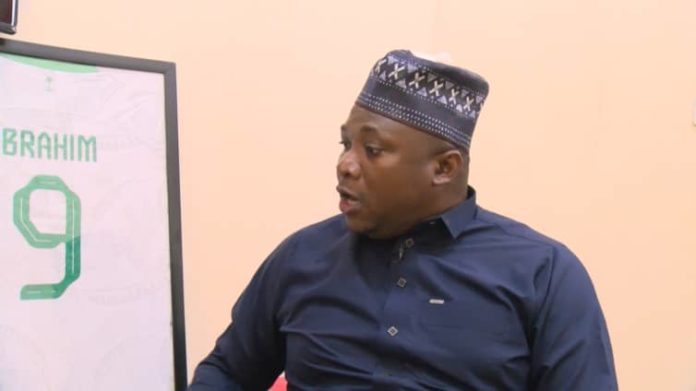A former Communications Director of the Ghana Football Association (GFA), Ibrahim Sannie Daara, has issued a warning to the government, urging immediate support for Ghanaian football clubs to prevent the collapse of the domestic leagues in the country.
Speaking on ‘Prime Take’ with Muftawu Nabila Abdulai, Sannie emphasised the critical role of government intervention in sustaining the sport at the national level.
Prime Take with Ibrahim Sannie Daara airs this weekend on JoyNews
“When a footballer sees that there’s no life beyond the football he’s playing after 35 years, they don’t earn so much. Most of the teams, all the teams in Ghana today, are owned by individuals,” he noted.
“It is individuals who are funding and paying for the kids of people, or Ghanaian youth, to become who they are.
“The state must support them. It must not be a one-man effort,” he admonished.
Hitherto, Ghanaian footballers and other athletes were employed by state companies.
The former BBC broadcaster reminisced about a time when the state played a pivotal role in supporting athletes.
Ibrahim Sannie Daara (left) speaking on Prime Take with Muftawu Nabila Abdulai
“In the past, when someone was playing in the domestic league, he was employed by the police or the army,” he recalled.
Easy Play, Easy Win. Play The Instant Games Online At MSport, Win Big Prizes Now.
Easy Play, Easy Win. Play The Instant Games Online At MSport, Win Big Prizes Now.
Fastest Fingers To Cash Out BIG in Few Seconds
MSport-Best Odds
“Ali Jarrah, for instance, was employed by the Fire Service. So was Sam Johnson. And a lot of them were employed by the Bank of Ghana.
“All of these state agencies had some way, somehow, something to do with sports recruitment when they recruited every year.”
He argued that the return of such initiatives would provide players with financial security and career longevity.
Sannie Daara wants support for domestic leagues in Ghana to avoid extinction
“These are some of the things that we must go back to. Otherwise, we have no fighting choice. They have to because they are state institutions,” he urged.
Sannie also proposed that the government not only change its strategy but also develop a comprehensive plan to integrate sportspeople into state institutions.
“They recruit sportspeople. Part of the sportspeople must be footballers, athletes, or boxers, so that the player knows that, one, they’ll get a salary from, say, if they’re playing and working with the police, they’ll get their salary from the police.
“They’ll get a salary added on to, maybe, from Hearts or Kotoko. Then, finally, when they retire from football, they’ll also have a full-time job to fall back on and a pension,” he explained.
By ensuring that players receive dual incomes—one from their football clubs and another from state employment—along with future job security and pensions, Sannie Daara believes that the domestic leagues can be revitalised.
He warned, however, that failure to act would spell the demise of local football.
“Otherwise, our domestic leagues will die, and it will be on their heads,” he concluded.
In this interview, which will air on JoyNews on Friday at 7:30 am, Saturday at 7:30 pm, and Sunday at 11 am, he talks about early life, family, professional life, exiting the FA, and working at CAF.





